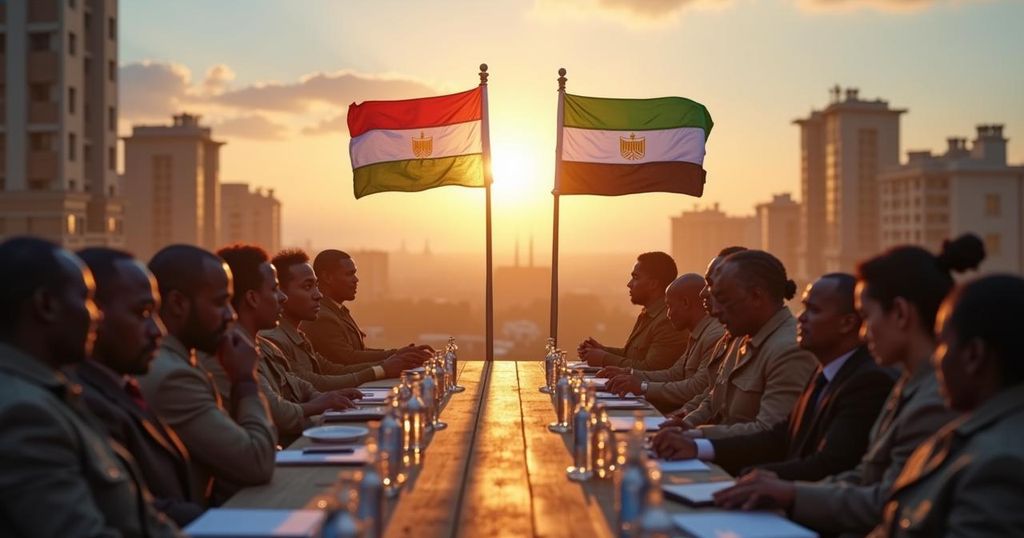The leaders of Somalia, Eritrea, and Egypt met in Asmara to enhance cooperation on regional security amid the fight against al-Shabab. They pledged to respect sovereignty and combat external interference, while the agreement marks a significant development in the context of existing tensions with Ethiopia and ongoing disputes related to military commitments and the Nile River dam.
The leaders of Somalia, Eritrea, and Egypt convened in Asmara, Eritrea, to strengthen cooperation in enhancing security within the Horn of Africa. The summit, attended by President Hassan Sheikh Mohamud of Somalia, President Isaias Afwerki of Eritrea, and President Abdel Fattah al-Sisi of Egypt, occurred against a backdrop of escalating tensions in the region, particularly as Somalia continues its struggle against the al-Shabab militant group. In a statement from the Eritrean information ministry, it was announced that the three nations have committed to reinforcing their collaboration aimed at improving regional stability. The leaders emphasized the importance of respecting the sovereignty, independence, and territorial integrity of countries within the region. Furthermore, they recognized the need to counter external interference in domestic affairs, emphasizing the necessity for coordinated efforts to foster stability and create a favorable environment for sustainable development. In regards to the security challenges faced by Somalia, particularly concerning the ongoing conflict with al-Shabab, the leaders reached a consensus on enhancing collaboration to combat terrorism in all forms, safeguard land and maritime borders, and uphold the nation’s territorial integrity. This security pact marks a significant strategic development, potentially leading to heightened tensions with Ethiopia, which maintains a substantial military presence in Somalia due to its engagement against groups linked to al-Qaeda. The relationship between Somalia and Ethiopia has recently been strained, particularly over Somalia’s deal with Egypt concerning military support and the latter’s commitment to contribute troops for a new African Union mission aimed at addressing the al-Shabab threat. Moreover, historical disputes between Egypt and Ethiopia persist due to the construction of a large hydroelectric dam on the Nile by Ethiopia, further complicating regional dynamics. Eritrea, although having previously supported Ethiopian government forces against Tigrayan factions, has expressed dissatisfaction over its exclusion from peace negotiations, adding to regional tensions. Despite these complexities, Ethiopian Foreign Ministry spokesperson Nebiat Getachew affirmed that the relationship with Eritrea is characterized by “good neighbourliness and good friendship.”
The Horn of Africa has long been a region of significant geopolitical tension, particularly involving the interactions between Somalia, Eritrea, and Ethiopia. Somalia is currently embroiled in an ongoing conflict with the al-Shabab group, which has necessitated international cooperation for security and stability. Eritrea and Ethiopia have a complex history, marked by conflict and recent alliances; Eritrea allied with Ethiopian government forces during the Tigray War but has felt marginalized in recent peace initiatives. Meanwhile, Egypt has been involved in a protracted dispute with Ethiopia over dam construction on the Nile River, which has ramifications for regional water security and politics. As these countries navigate their historical grievances and contemporary challenges, their recent pact for enhanced cooperation reflects a strategic response to mutual concerns regarding security and regional stability.
The recent summit among Somalia, Eritrea, and Egypt signifies a pivotal move towards strengthening regional security cooperation amid ongoing challenges, particularly against terrorism. The leaders’ commitment to respect sovereignty and confront external interference highlights the urgency of collaborative efforts in enhancing stability in the Horn of Africa. However, such agreements could have repercussions for Ethiopia, evidenced by existing tensions arising from military commitments and territorial disputes. Ultimately, the developments from this summit may reshape the security landscape in one of Africa’s most challenging regions.
Original Source: www.aljazeera.com







